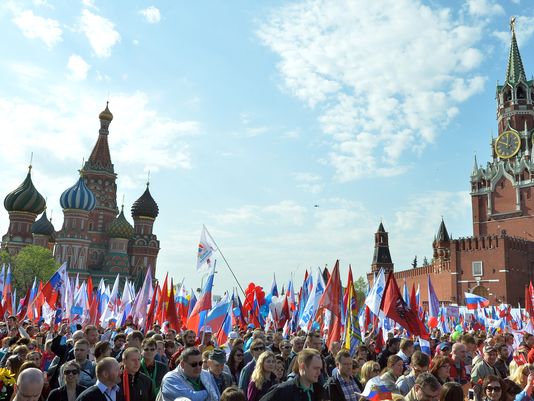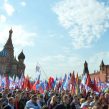
Rebuilding the USSR
Publication: Eurasia Daily Monitor Volume: 11 Issue: 81
By:

This week, on May 1, an estimated 100,000-strong, pro-government demonstration of “working people” was allowed on Red Square for the first time since 1990. The march was organized by state-controlled trade unions and supported by the ruling United Russia party as well as the Kremlin-backed Moscow mayor, Sergei Sobyanin (https://www.interfax.ru/print.asp?sec=1448&id=374533). The Kremlin rulers are massively using old Soviet ideological and propaganda clichés as the crisis between East and West over Ukraine and Crimea accelerates, Russia’s international isolation deepens, and a new cold war looms—with a possible red-hot regional war in Ukraine between pro-Western and pro-Russian forces being a distinct possibility.
Large state-sponsored May demonstrations of “the working people” were organized all over Russia with especially large ones in newly annexed Crimea—in Sevastopol and Simferopol. The Moscow Red Square march supported the “reunification of Crimea” and denounced US imperialism, as during the days of the Cold War. In all, an estimated 2.5 million “working people” took part in the state-approved May Day demonstrations all over Russia (https://www.interfax.ru/russia/374557).
The same day, in the Kremlin, President Vladimir Putin handed out “Hero of Labor of the Russian Federation” medals. In the Soviet Union, the “Hero of Labor” and “Hero of the Soviet Union” golden medals were the top state honors for civilian and military achievements. The Hero of Russia honor was swiftly reinstated under its new name in March 1992, after the Soviet Union’s collapse. The Hero of Labor war recreated last year by Putin to honor “the working people” (https://www.interfax.ru/russia/374549). The Red Square demonstrations and Hero of Labor award ceremonies are part of the PR effort to reinforce the “patriotic connection between the masses and the Kremlin” as most of the nation genuinely celebrates the Crimean annexation (“Crimea is ours”). Russia enjoys a long holiday weekend until May 5. State-controlled TV channels advise the population to continue the official demonstrations with patriotic feasting at barbecues with beer and vodka, remembering the good old Soviet times (https://www.ntv.ru/novosti/942396/).
Russian propaganda, meanwhile, has been ridiculing Western attempts to “punish” the country with sanctions, while promoting the virtues of Soviet-style self-isolation and self-support. Today, nether the top rich bureaucrats and oligarchs, nor the working classes seem ready to do anything to stop Russia’s unstoppable slide into isolation (https://www.gazeta.ru/comments/2014/04/25_e_6006013.shtml). The mostly liberal Kommersant daily insists that the new sanctions announced this week by the United States and the European Union are mostly meaningless and are an attempt by US President Barack Obama to “save face” by announcing something, since he cannot or will not do anything serious (https://www.kommersant.ru/doc/2462844). Russian Foreign Minister Sergei Lavrov has called the new US sanctions “an act of desperation” and a display of the total failure of US foreign policy. According to Lavrov, “Russia will, at present, refrain from immediately reacting to sanctions,” giving “our partners” some time to reflect and reconsider before going too far (https://www.interfax.ru/print.asp?sec=1446&id=374506).
Moscow has been doing its best to exploit transatlantic differences, eager to press European countries not to follow Washington and to seek accommodation with the Kremlin. Such accommodation would, apparently, be based on accepting as a fait accompli both the Crimea annexation and the establishment of a de facto sphere of Russian influence in Ukraine and Eastern Europe. This could allow a return to business as usual: buying and investing in Russian gas, oil and metals, while selling industrial produce, technologies, luxury goods and banking services (https://www.ng.ru/editorial/2014-04-30/2_red.html).
Moscow is threatening to close the North Atlantic Treaty Organization’s (NATO) Information Bureau in Moscow, which is attached to the Belgian embassy, “since NATO seems unready for a reasonable dialogue,” according to Kremlin sources. In 1999, during the NATO bombing campaign to free Kosovo, the NATO Liaison Mission was closed in Moscow without warning and its staff was given 24 hours to leave. In 2001, the mission was reopened as an Information Bureau, but was plagued with problems: In 2009 two diplomats, including the bureau director, were expelled (https://www.kommersant.ru/doc/2462322).
The Kremlin does not like or trust multinational Western institutions—namely, NATO and the EU—preferring to interact with national governments and leaders, eager to split the West into quarrelling sub-entities. At present, the Russian propaganda machine is telling the population that Obama and the North Atlantic Alliance are paper tigers and do not have sufficient military resources in Europe to stop Russia. The military forces of European NATO members have been decreased in number and seem dysfunctional, with Germany having only 250 tanks left, France with 204 tanks, and the United Kingdom possessing even fewer. The Dutch and the Belgians have no tanks at all (Russian experts sine the Second World War link military might directly to the number of tanks). “Who will stop Russia? The Poles?” asks a popular Moscow weekly, adding, “The Russian tactical nuclear arsenal dominates Europe, and Russian jets can sink any US Navy ships in the Black Sea at will” (https://argumenti.ru/army/n435/334051).
On April 28, Russian Defense Minister Army-General Sergei Shoigu had an hour-long phone conversation with his US counterpart, Defense Secretary Chuck Hagel. According to the Russian defense ministry’s official account, Shoigu confirmed that last week Russian combat troops were moved up to the Ukrainian border, but did not cross it after Ukrainian government troops desisted their activities. According to Shoigu, “Russian forces have returned to their permanent bases.” Shoigu accused NATO and the US of deploying forces on Russian borders and of “making provocative calls to restrain Russia” (https://function.mil.ru/news_page/country/more.htm?id=11922598@egNew).
On April 24, skirmishes were reported between armed pro-Russian separatists and Ukrainian security forces at rebel-controlled roadblocks on the outskirts of Slovyansk. “We are forced to respond,” announced Shoigu in response to the skirmishes. He added, “Joint forces battalion tactical groups of the Southern and Western military districts have begun exercises in the proximity of the Ukrainian border, ready to go into action, supported by airpower.” As the threat of an imminent, full-scale Russian invasion became clear, according to Ukrainian intelligence sources, the Ukrainian security forces withdrew their forces from the outskirts of Slovyansk (see EDM, April 24). Apparently, after this withdrawal, Moscow aborted an invasion at the last minute, as Shoigu seems to have indicated.
However, in contradiction to Defense Minister Shoigu’s remarks, NATO sources this week have stated they do not see any serious withdrawal of Russian forces from the Ukrainian border. According to Russian sources, some battalion tactical groups have indeed withdrawn to resupply and demobilize the conscripts who have ended their one-year military service, but they have been replaced (https://www.vedomosti.ru/newspaper/article/671821/vojska-otoshli-za-popolneniem). The threat of a major military escalation is today the same as last week.




